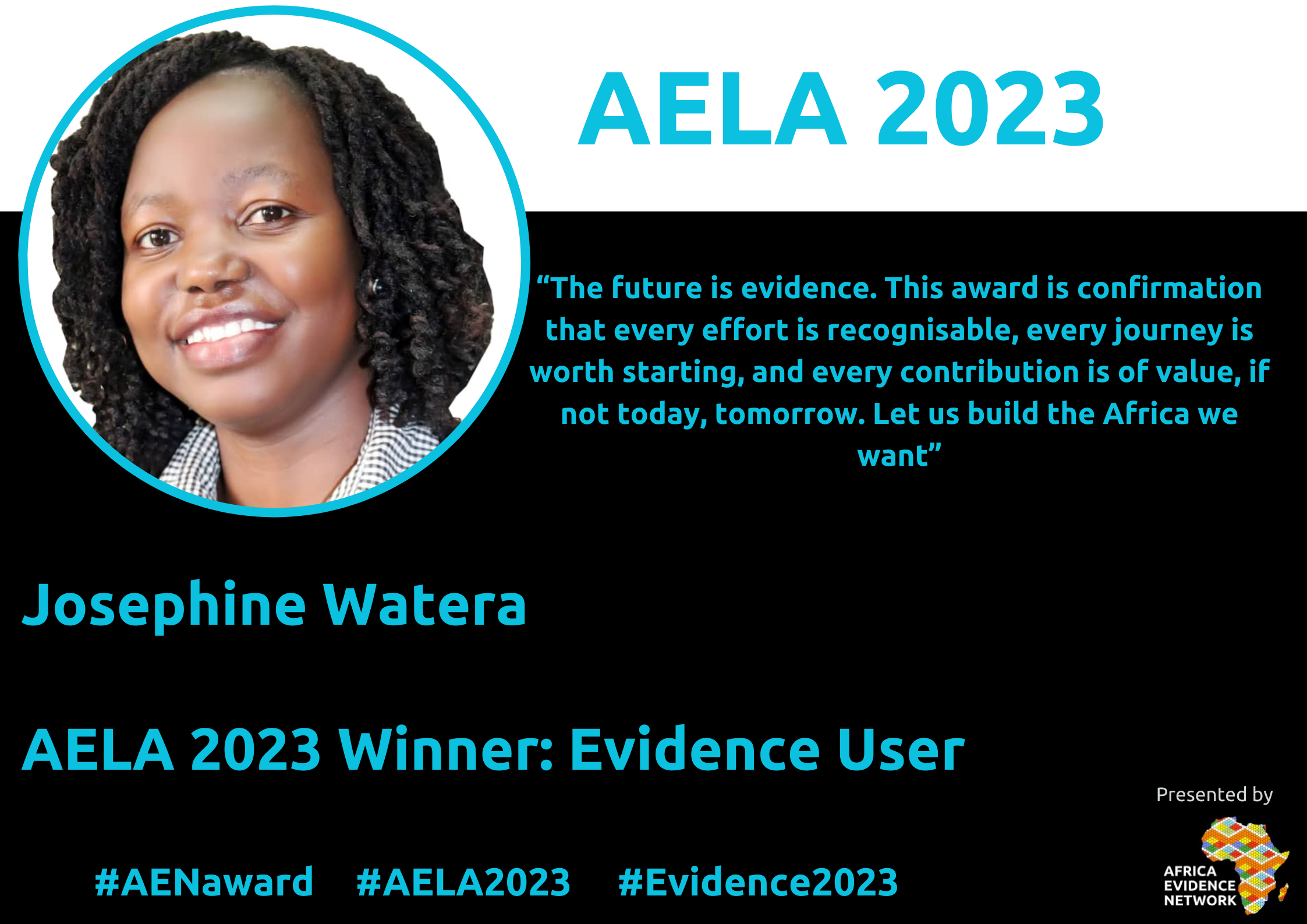
Josephine Watera, is the recipient of the Africa Evidence Leadership Award 2023 in the Evidence User category offered by the Africa Evidence Network. We asked Josephine to reflect on what winning the AELA Award means for her work.
The Africa Evidence Leadership Award (AELA) is highly distinguished. As a practitioner in the evidence use eco-system for the past 16 years, it is very encouraging and humbling for my work to be openly recognized. From the first edition of the AELA, it had always been my desire that one day I would receive this coveted Award. I felt so much joy when I got the news that I had been nominated and shortlisted. The rest of candidates had very strong CVs having made tremendous contribution in the field of evidence use. The voting process felt like a year because of how anxious I was. I am so delightful and grateful to the AEN members for the confidence in their vote that enabled me to emerge as a winner of the award under the evidence user category.
The Africa Evidence Leadership Award (AELA) is a critical platform for showcasing practitioners with distinguished leadership in the field of EIDM as generators, producers, brokers, and users. The nomination and selection process of the Award allows members of the Africa Evidence Network an opportunity to reflect on stories and individuals who are influencing their spaces and making a difference using evidence. The Award is proof that evidence matters, and we all can play a part. In the era of decolonizing evaluation and promoting the agenda of made in Africa evaluation, this Award is a great milestone for celebrating our own in the African continent.
This award will be highly beneficial to me individually but also my work. As a chapter contributor to the book entitled, “African Parliaments: Evidence Systems for governance and development”, this Award will draw many people to read my work and specifically appreciate the context of parliaments.
Being the first Ugandan to receive this award and the Vice President of Uganda Evaluation Association, this award will motivate other practitioners in the field to do more and draw many Young and Emerging Evaluators under my mentorship into the Network.
The Award comes at the time when I am in the advanced stages of completing my Doctoral Degree in Programme Evaluation at the University of Cape Town, South Africa. I am researching on drivers and constraints of evidence use in the parliaments of Uganda and South Africa. This doctoral study is based on an insider’s perspective and therefore this Award gives me great joy that my contribution to the EIDM space in the Parliament of Uganda has gained recognition as early as this.
I believe this award bestows on me the role of an ambassador of evidence in the continent, hence I will be keen to use every opportunity to advocate for EIDM spaces and means of strengthening. I specially dedicate this Award to the different teams I have worked with that enabled my name and work to be visible to all leading to being voted as a winner. These include my department of research services in the Parliament of Uganda, the peer-learning team of evidence practitioners from CLEAR-AA, the Uganda Evaluation Association, the International Development for Development Evaluation and my dear friends in the Africa Evidence Network.
I am aware that I will be receiving the award in the upcoming Evidence 2023 Conference from 13th to the 15th September 2023 Entebbe, Uganda. I am looking forward to stepping on that big stage, all lights on me, with loud cheers and honourably receiving the Award. The theme of Evidence 2023 is coming together to build a knowledge base for evidence-informed decision-making practice, this is my call too. There is great untapped potential in the continent, and no one can do it better than ourselves. The AEN is known for facilitating learning and collaboration in the EIDM field. I look forward to continued learning, sharing, and relationship-building; an opportunity for connection and development of new ideas on supporting EIDM; and opportunities to share EIDM practice experiences of different experts.
Disclaimer
The views expressed in published blog posts, as well as any errors or omissions, are the sole responsibility of the author/s and do not represent the views of the Africa Evidence Network, its secretariat, advisory or reference groups, or its funders; nor does it imply endorsement by the aforementioned parties. Acknowledgments do not imply endorsement of the content.